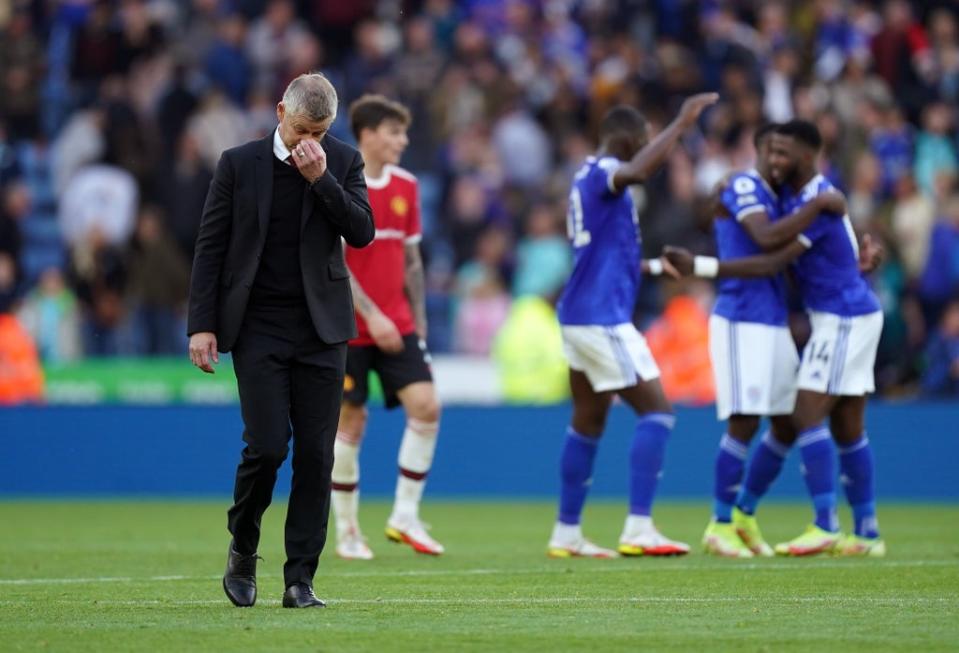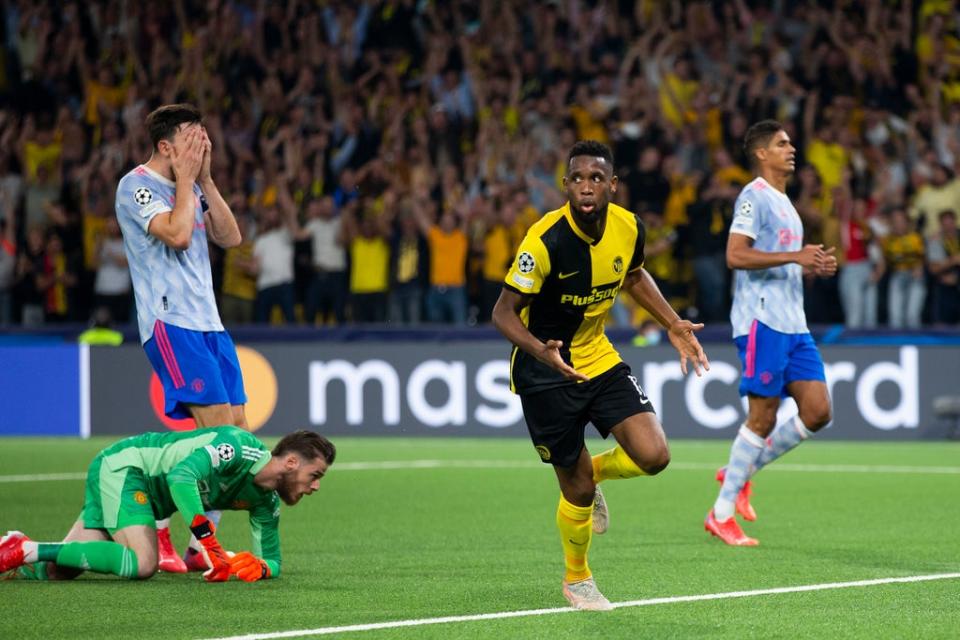With problems in Manchester United dressing room and on the pitch, can Ole Gunnar Solskjaer save his job?

In the dressing room after Manchester United’s 1-1 draw with Everton, one star player was aimlessly raging about “the same mistakes every single game”. In the other dressing room, Rafa Benitez was actually criticising his team over “two points dropped”.
The two scenes point to significant football issues that are only increasing the pressure on Ole Gunnar Solskjaer.
The first is that his own squad know something is wrong with the team. It has sapped confidence. The second is that opposition teams realise that. They know United are easy to get at right now, and it’s not hard to figure out where.
This was what Brendan Rodgers reasserted to his players at half-time on Saturday. It led to the change at half-time as Leicester City just upped it and won 4-2. It did not represent any real change in pattern though. United have barely played well in any game this season and have instead only got worse.
The current spell is as bad as Jose Mourinho’s final months at the club, and probably Solskjaer’s worst since the final months of that 2018-19 season. United have only won twice in the seven games since Cristiano Ronaldo’s return match against Newcastle United. Both of those victories, over West Ham United and Villarreal, were dependent on late goals in two more matches that could really have gone either way. The 2-1 win over Villarreal should really have gone the other way – by some distance. Unai Emery’s side were left with a greater feeling of regret than Benitez.
The feeling at United’s top level remains the same though. Ed Woodward is still 100 per cent convinced that Solskjaer will become a transformative figure. The executive vice-chair is leaving his post at the end of the year, but his opinion influences the ultimate decision-maker, Joel Glazer. United’s business model means they don’t usually move until top four looks unattainable, and there is full faith Solskjaer can still secure that Champions League place.
It is said that one moment that proved convincing for Woodward was when he walked by the Norwegian's office and found him planning out the team for seasons to come in the future. Some critics would say that much more forensic and detailed planning is necessary, especially for the games to come in the next few weeks.
Solskjaer used to have a capacity for conjuring big results out of nothing, and particularly poor form, but that was something that started to disappear last season. He badly needs to rediscover it for this hugely challenging run, in order to save the season and maybe save his job.
As convinced as United might be that he is the right man for the future, nothing tests such stances like three months of bad results. That is what the current spell could well become, given the challenges ahead in the league alone. United play the other “big six” in their next seven fixtures.
Even Atalanta before that, however, pose real problems. That’s how bad it’s been for United of late.
Many around the club are expecting a big decision for Wednesday’s game, as Solskjaer just attempts to jolt a reaction from his team. It is possible that even Bruno Fernandes could be dropped. Any such decision, or even if it was Paul Pogba or Ronaldo, would mark a change from Solskjaer. A prevailing view from those close to the dressing room has been that the Norwegian is currently just accommodating individuals rather than cultivating a team that works. The effects of that could be seen on Saturday.

First of all was the disastrous decision to play Harry Maguire, who simply didn’t look fit. Without Raphael Varane, Solskjaer felt he had to have one of his first-choice centre-halves in. Sources from within the club maintain that the manager does like Eric Bailly and Axel Tuanzebe as players, but constantly has reservations over whether they will stay fit, which means he is reluctant to build partnerships with them. Bailly can also be erratic.
An alternative opinion is that if Solskjaer had a proper tactical structure in place, individuals could more easily slot in, as has been seen with Thomas Tuchel’s Chelsea. The biggest effects of this lack of structure were nevertheless evident further forward.
There were moments against Leicester that were frankly remarkable. A few instances involved all of Ronaldo, Mason Greenwood, Bruno Fernandes and Jadon Sancho just standing idly as Rodgers’ side played through them.
This wasn’t exactly high-end coordinated modern pressing. It wasn’t even simple blocking off of angles for a pass. It was just bizarrely passive and lethargic. That stood out all the more against the coherence and sharpness of Leicester. Rodgers's side displayed a modern pressing structure, which is now as important to how an attack is constructed as what they do with the ball.
This has similarly been the lesson of so many United games this season. Their fixtures have ultimately been matches between teams with systems and one team without. That’s what Saturday was. Rodgers had a clear plan. Solskjaer is still so dependent on individual moments.
Sancho’s struggles arguably symbolise much of this. Those who know the winger say that he is still greatly adapting to the change in approach as much as the change in country and league. At Borussia Dortmund, Sancho was playing in a system where there were all sorts of triggers about what to do and when. One feeling is that United’s play isn’t currently technical enough for Sancho at this stage of his development.
The message is more “take them on, son”. At Dortmund, teammates were coached to play all manner of runs that served as signals as when Sancho should go or pass. At United, they make far fewer runs, and many of them just attract defenders. This is one reason Sancho hasn't looked himself. There just isn’t the same integration as at Dortmund. There are only better individuals.
This has recently brought more scrutiny on Solskjaer’s choice of coaches, especially as he seems to position himself more as a figurehead manager. That is another approach that is out of sync with the modern game, given that all of his peers at major clubs – Tuchel, Pep Guardiola and Jurgen Klopp – are very much manager-coaches.
They’re really football “auteurs” in that regard. What we see on the pitch is their very defined vision of football. Solskjaer’s is nowhere near so clear. His vision can be vague, and influenced by different voices among the coaches. The Independent has been told there were some fractious words in the defeat to Young Boys, although nothing serious.

Kieran McKenna is said to be the most attack-minded coach, and felt it was a mistake to take Sancho off in that game. Michael Carrick doesn’t offer so much in terms of team structure, but is said to be excellent with individual advice to players. Darren Fletcher is similar and getting more involved. Mike Phelan still offers a lot of advice to the manager, especially during games.
And that’s the more pertinent point. Regardless of the coaching staff, it is still all feeding up to the manager. Everything is dependent on his interpretation; his idea.
One growing argument is that Solskjaer did at least have a clear idea of the team going into August. He knew all that was missing was a holding midfielder. That would at least offer balance, even if there were still fair questions about the deeper level of coaching. The team was nearly there. Instead, he was given Ronaldo. The signing has changed a lot.
Solskjaer naturally rang Sir Alex Ferguson when the deal was mooted, to bounce ideas off his mentor about what could be done. Ferguson’s view was of course to just do the deal.
Ronaldo’s approach to scoring is similarly direct. If you get the ball to him in the right position, he will score. That remains undeniable. That remains so persuasive. His record this season is still so good, even though he has not scored in the league since 19 September.
The problem is getting the ball into that position. Some of the doubts that stemmed from Ronaldo’s time at Juventus have proven similarly difficult to deny.
The nature of his game at the age of 36 means that a team has to be structured in a specific way around the Portuguese to get the best out of him. It brings the benefit of goals, but at the cost of unpredictability. There’s then been the predictability of Ronaldo’s complete lack of defensive work. This was what Juventus often complained about. They were frequently working with 10 men when they didn’t have the ball. Except, at points on Saturday, United looked like they were working with six.
None of this would matter so much if United had that structure around Ronaldo. But that hasn’t been the case. There were instead only gaps, as could be seen against Leicester. A number of opposition coaches have realised how to exploit this. Leicester’s 3-4-1-2 worked superbly against United, and Atalanta play a similar system.
This may be where Solskjaer’s big decision becomes so important on Wednesday. It feels likely he will eventually revert to a three-man midfield to make United more stable, allowing them to dig in and build confidence again.
That can change things. That can make individuals inspired again. That can restore the team to these rousing wins that are secured by sensational moments. They can bring a run again. It’s just that, after such expenditure, it’s fair to expect more from the side.
Solskjaer has so far not gone beyond a return of 1.95 points per game in a single season. His first, having come in halfway through the 2018-19 campaign, was 1.93. His second was 1.73. His third was 1.95.
These figures represent the minimum guaranteed return from the club’s level of expenditure. Basically, if you spend as much as United, you’ll get at least 70 points. They indicate that Solskjaer has pretty much performed to par, especially since he hasn’t even surpassed Jose Mourinho’s 2017-18 return of 2.13.
There was of course surgery to be done after the Portuguese’s fractious period at the club, but we’re well past that point.
This summer was supposed to represent a significant step forward. Solskjaer’s point return right now is 1.75. It currently feels like it’s been a big step back.
He badly needs to change momentum, as well as so much in the team.
Read More
Leicester strip bare Manchester United’s flaws to reveal Ole Gunnar Solskjaer’s limitations

 Yahoo Sports
Yahoo Sports 